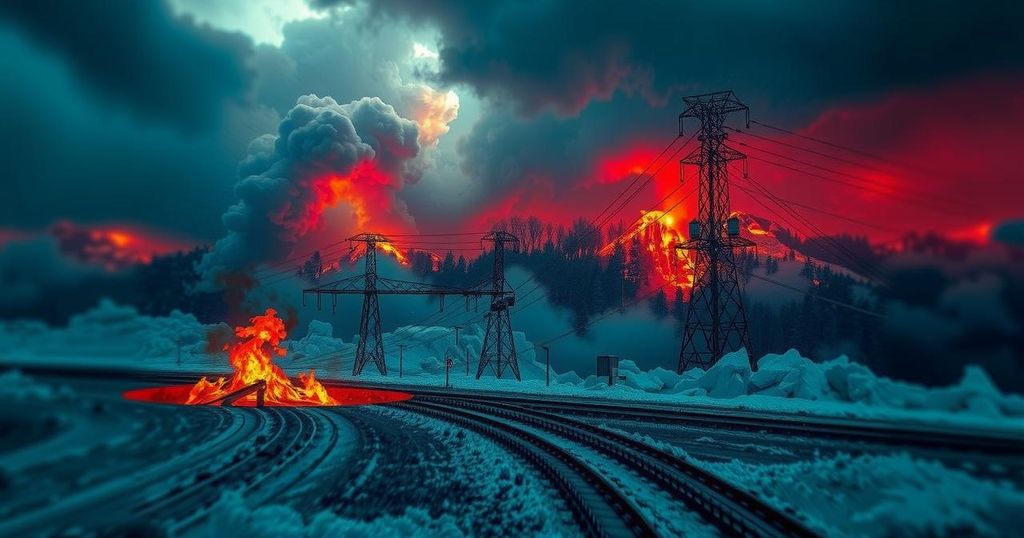Analysis Shows Climate Change Intensifies Deadliest Weather Events
Human-induced climate change has made the ten deadliest extreme weather events of the past two decades more intense and likely, resulting in over 570,000 fatalities, as analyzed by scientists from the WWA group at Imperial College London. Key findings reveal that major occurrences, including droughts and heatwaves, have been exacerbated by climate change, emphasizing the urgent need for reduced fossil fuel reliance to combat this crisis.
Recent analyses conducted by the World Weather Attribution (WWA) group at Imperial College London have revealed that human-induced climate change has intensified the ten most lethal extreme weather events occurring over the last two decades. These catastrophic events, which include storms, heatwaves, and floods, have collectively claimed the lives of over 570,000 individuals across regions such as Europe, Africa, and Asia. Dr. Friederike Otto, co-founder of WWA, emphasized the urgent need for political leaders to recognize that reliance on fossil fuels contributes to the ongoing climate crisis, stating that, “If we keep burning oil, gas and coal, the suffering will continue.” The investigation specifically examined significant weather occurrences registered since 2004, when the first evidence linking such events to climate change emerged. The study identified a devastating drought in Somalia in 2011 as the deadliest event, attributing the estimated death toll of over 250,000 to climate alterations that exacerbated low rainfall conditions. Furthermore, the analysis highlighted the 2015 French heatwave, where approximately 3,000 fatalities were deemed to be twice as likely due to climate change, as well as the lethal heatwaves of 2022 and 2023 in Europe, which resulted in 53,000 and 37,000 deaths respectively—events that would have been highly improbable in the absence of climate change. The report also noted that tropical cyclones in Bangladesh, Myanmar, and the Philippines between 2007 and 2013 were amplified in intensity and probability due to climate changes, along with the floods in India in 2013. Researchers caution that the actual figures for mortality related to these weather phenomena are likely significantly understated, particularly in developing nations where heatwave fatalities are frequently underreported. The methodology employed by WWA allowed scientists to connect the dots between individual weather events and their correlation to rising global temperatures, leveraging previously established atmospheric models to ascertain the likelihood of such occurrences in the present climate compared to a scenario without industrial emissions. This innovative approach enables a clearer understanding of how climate change impacts extreme weather events. Roop Singh of the Red Cross Red Crescent Climate Centre articulated that, “The massive death tolls we keep seeing in extreme weather shows we are not well prepared for 1.3°C of warming, let alone 1.5°C or 2°C.”
The relationship between extreme weather events and climate change has gained increasing attention in scientific and political spheres. Historically, scientists have struggled to assign specific weather events to climate change due to the complexity of atmospheric processes. However, the establishment of methodologies to analyze how global warming influences the frequency and intensity of severe weather has paved the way for clearer connections. By examining historical data and employing advanced climate models, researchers can identify the likelihood of specific weather events occurring in our current, warmer climate as opposed to a scenario where human-induced emissions are absent. This ongoing research underscores the pressing need for global action to address climate change and mitigate its devastating effects on human life and the environment.
The study conducted by the World Weather Attribution group highlights a troubling trend wherein human-induced climate change has exacerbated the severity and frequency of extreme weather events, resulting in significant loss of life. The findings indicate a clear need for greater resilience and preparedness against future climate-related disasters, particularly as the world approaches even higher temperature thresholds. Political leaders are urged to take immediate action towards reducing reliance on fossil fuels to alleviate further suffering linked to climate change. As articulated by experts, every incremental increase in global temperatures will likely lead to more catastrophic weather events, necessitating urgent global cooperation and preparedness to tackle the impending challenges posed by climate change.
Original Source: www.bbc.com




Post Comment